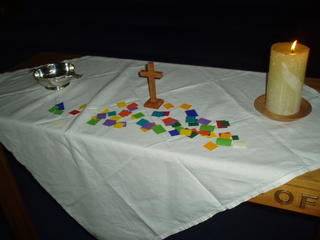
Yesterday we used the colour tiles again. Steve Taylor had suggested 'colouring our worship' 4th August 2005. and how we name the wide range of emotions and experiences people bring, we bring to church. So.. with permission, as I already had used these tiles in another way previously, we passed round the basket and each person selected a colour. We were looking in Jonah 4 and Jonah’s anger – we listed the things that make us angry,especially the anger that is unrighteous and comes from thinking it's all about us. We did this with a screen in front of the communion table. We then removed the screen to reveal the table. Then, inviting people to select a colour that reflected their mood generally this week, this morning. As they came forward for communion they first placed the tile on the table and ready to accept Christ’s com-PASSION for us in these gifts at this table.
Expressionism was one of the main currents in art in late 19th and 20th centuries. Expressionists attempt to depict the emotions and responses that objects and events arouse in him/her. Unlike Impressionism, its goals were not to reproduce the impression suggested by the surrounding world, but to strongly bring the artist's own sensibility to the world's representation. It seems to me that there is something about what and how we express ourselves in church that needs to move us beyond the impressionistic worship forms. To allow for expressionistic, even abstract expressionism(!) I see as a way of recognising who we are in God's presence with greater honesty and in relationship.
Peter Matheson, (in The Imaginative World of the Reformation) states:
Simplicity is often at the heart of genius. Luther reached straight to the
heart of things, disregarding all peripheral issues and fussy details. In
his....very popular and influential book of prayers for lay people, his aim was
to provide an alternative to a calculating piety which weighed sins against
merits and sought to insure against failure by multiplying devotional exercises
and good works... removing legendary accretions and all Uberfluss, or
superfluity of words. What God really wanted from us was our sighs and tears.
(122)
I’m finding people are more and more open to engaging in this way and it helps bring who they are honestly before God. We have often been starting with a story, a question before we do much else in worship, so that we begin to cease a little and come to rest in God as we worship. I think we’ll try it at one service in the month and see how this develops among us as we deal with some Uberfluss among us and in each of us!